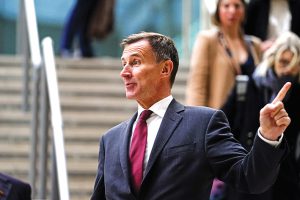BLOOMBERG
Chancellor of the Exchequer Jeremy Hunt will hand business a three-year tax break worth about £11 billion by replacing the UK’s most generous ever investment allowance with a temporary measure in next week’s budget, according a government official with knowledge of the matter. Corporation tax rises from 19% to 25% in April, when the so-called super-deduction also expires, a double whammy that companies warn will deter investment. Under the replacement full-expensing regime, companies will continue to save 25 pence on their tax bill for every £1 invested.
Hunt has said reducing business taxes is his priority but the full-expensing employer groups have called for appeared to be too expensive under his fiscal rules. The chancellor will limit the relief to three years and propose a permanent replacement in the Conservative Party’s manifesto before the next election, which is expected next year, according to another person who was briefed on the matter.
The super-deduction allowed companies to deduct 130% of investment spending from their taxable profits, with corporation tax at 19%. Full-expensing will reduce the relief to 100%, with corporation tax at 25%.
Business have been warning the government for months that the double shock in April will encourage companies to shift investment elsewhere. The UK already lags behind Europe and the US and, with both recently unveiling hundreds of billions of pounds of investment subsidies, the risk is the UK falls even further behind. Last year, Prime Minister Rishi Sunak put business investment at the heart of his long term economic vision. He made the £1 million annual investment allowance permanent in November and is also looking at targeted low-tax investment zones to help level-up poorer regions.
Limited Headroom
Full-expensing seemed impossible after the government’s spending watchdog made it clear there would be no money for permanent giveaways in the budget. Hunt is expected to have only £10 billion to £15 billion of headroom against his rules.
As the break is aimed at long-term multibillion-pound projects, a permanent regime seemed necessary. However, long-term visibility is not possible because an election must be held by January 2025. Putting a temporary regime in place until April 2026 and making election manifesto commitments is as close as the government can offer. By withdrawing the policy before the fiscal rules bite in 2027-28, the chancellor will also be able to claim that he is bringing debt down as a share of GDP and keeping borrowing below the 3% of GDP limit. The opposition Labour party has also pledged investment tax breaks. A Treasury spokesperson said they can’t comment on tax policy ahead of the budget.
UK Budget preparation upended by rush to limit SVB crisis
Chancellor of the Exchequer Jeremy Hunt’s budget preparations have been upended by the rush to limit damage from the collapse of Silicon Valley Bank as Treasury officials race to finalize a support package for the UK’s tech sector.
Hunt is due to present his Spring Budget to lawmakers on Wednesday and is under pressure to boost growth amid forecasts of a recession and to address a prolonged cost-of-living crisis. The collapse of SVB has left the government looking to ringfence the country’s technology and life sciences industries from the biggest US bank failure in years.
The SVB fallout has interrupted Hunt’s preparatory work this weekend ahead of the budget as he attends emergency meetings with Prime Minister Rishi Sunak, Bank of England Governor Andrew Bailey and City Minister Andrew Griffith to address the situation.
 The Gulf Time Newspaper One of the finest business newspapers in the UAE brought to you by our professional writers and editors.
The Gulf Time Newspaper One of the finest business newspapers in the UAE brought to you by our professional writers and editors.
